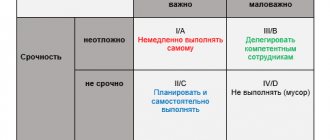Everyone is interested in how to achieve their goals effectively and quickly. After all, the life of every person is filled with movement, meaning, and values. In the endless race for success, it is not always possible to achieve the desired results.
Only a few manage to independently analyze errors and achieve their goals. Also, the behavior and algorithm of actions are adjusted and filled with incentives by following specific advice. How to achieve your goals in life, set benchmarks and achieve them within the planned time frame - in this article.
Where to begin
In order to choose a direction, following which will lead to new achievements , you should understand the following rules:
- It is necessary to set only valid goals for yourself. Things that are not achievable in principle will only take up time and energy. Instead, you could spend yourself gaining material possessions. For some ideas, you can stop at conceptualizing or experiencing;
- In their own desire to achieve what they want, people do not realize that they are going the wrong way and are wasting their energy on fulfilling other people’s desires. This can happen when a person tries to become a media personality or a famous scientist. In fact, this is an incorrectly set goal, since the result is focused on rising in the eyes of parents, acquaintances or social environment;
- Do not forget that happiness is a moment that is not experienced very often in life . In overestimating one's own potential, the end result itself may not bring as much joy and euphoria as it seems at first glance.
Knowing how to quickly achieve his goals, a person begins to think through every step , in search of a reasonable and rational solution. The ability to achieve the desired result often comes with age. In practice, there is a category of people who spend 1-2 months searching for a solution.
Clear wording
The first thing to start moving towards a goal is its clear formulation. Lengthy expressions are unacceptable in the psychology of success: “I want to be rich,” “I want to succeed in my career,” “I want to be happy, but I don’t know how.” In order to succeed in any business, you must clearly see the end result in front of you and know what you want.
The expressions of a person who clearly represents his goal take the following form: “I will become a famous writer,” “I will become the head of a department,” “I will be an actress,” “I will earn a million in 1 year.”
It follows from this that a person knows how to achieve his goals, and, based on the formulation, will build a strategy. Let's say that in order to become a famous writer, he will throw all his energy into writing a book with an original plot. The future head of the department will develop a project that will result in a promotion for him. A girl who dreams of becoming an actress will go to enroll in a theater school. Do you feel the difference? In the first case, the person says: “I want, but I don’t know how,” and in the second: “I want, I know how, and I will achieve it!” A clear vision of your goal will bring you closer to the result much faster than you will wander in the darkness of your consciousness, trying to find the line between your dream and doubts.
Barriers to desires
Applying a scientific approach to how to correctly achieve your goals, psychologists have identified a list of factors that prevent a person from achieving their intended results. These are specific types of obstacles that take time to overcome:
Insufficient level of education
Lack of awareness leads to the failure of your own business, since running a business requires special knowledge and skills. To overcome this problem, you can set yourself up for higher education or enroll in specialized courses. If mastering the chosen direction is impossible due to lack of time or finances, they turn to open sources of information published on the Internet.
This problem becomes easily solved with a comprehensive study of the details of the idea and the development of a concept for implementation.
Fear of failure
This purely psychological phenomenon has haunted a person since childhood. The barrier is that a person is not so much worried about the final result as about the degree of seriousness of the actions performed. In practice, the level of involvement in the process increases as the end of the task . For this reason, on the way to their own dreams, people often give up or slow down greatly.
The temptation to give up will be strong shortly before victory...Chinese wisdom.
It has been proven that the presence of such a psychological barrier extends from childhood. Excessive criticism of a child or constant reproaches form in the minds of the future personality a fear of committing serious and sometimes even ordinary actions. It’s not that such people don’t know how to achieve the goals they set for themselves . They lack the desire to act due to the fear of running into criticism. In the future, this phenomenon will undergo serious adjustment with the help of professional psychologists.
Dispersion of attention
Next on the list of barriers that prevent you from climbing the career ladder or making a woman fall in love with you is unfocused attention. By focusing on dozens of things at once, instead of concentrating on just one, the hero does not achieve his goal.
If you chase two hares, you won’t catch either one...Russian wisdom (from the collections of A.P. Chekhov)
In the course of striving, a person simply burns out. Overcoming the barrier is seen in changing the mood, decomposing one task into five or ten independent processes.
A journey of a thousand leagues begins with one step...French wisdom.
Unfair comparison
Comparison remains an acceptable maneuver in self-assessment, analysis of what is happening and subsequent criticism of wrong actions. In the case when a person who knows how to learn how to achieve his goals immediately begins to try on the results of successful individuals, this can cause, at a minimum, dissonance.
What is the difference between a goal and a destination and a dream?
A dream is a cloud of thoughts, it is something vague. Erema lies on the stove, scratches his belly, and thinks, “It would be nice to eat some fish soup.” A dream is a substance without weight and time; you can be a great dreamer, with a rich inner world, but a deeply unhappy person.
Destination is a long journey. What you came into this world for. This is a global concept that brings moral satisfaction. For example, helping people or animals.
Actors, for example, may have a purpose - to make this world a little happier, more smiling, more emotional. Purpose is embedded in us. It is within us, from birth. You can find your purpose by reaching an agreement with your subconscious.
And a goal is a specific, measurable object or action located from the outside - this is a SMART goal (detailed description with examples here). And the task is even smaller. This is a specific action that will lead us to the goal.
It turns out to be such a funnel: a dream is vast, without clear boundaries, a destination is a path that is comfortable to follow. A goal is the end result, while a task is a step towards the goal.
If you don’t want anything, apathy, your soul is turning you back, start by defining your purpose. You may not realize that you are not moving on your own path. You can work with machines, mechanisms, papers (inanimate objects) for a long time and feel sick.
But it turns out that your purpose is to work with people. They changed their field of activity, and that’s it - other emotions began to appear, the sun began to shine brighter. It may be exactly the opposite: a person has been with people all his life, but he is comfortable with mechanisms.
Of course, it would be good to decide on this issue before leaving school, and not go where your parents want or by “inheritance” - your great-grandfather was a doctor, he was a doctor, your father is a doctor and you are heading into medicine. Listen to yourself, your heart. Maybe with cars my soul will open up more.
But if laziness has overcome you and you don’t know how to cope with it, read a separate article.
How to achieve your goals - ways
Even performing the tasks of others, for example, your employer, is always fraught with difficulties. The same thing happens when a person begins to achieve his own victories, gradually moving towards the level of his intended capabilities.
It is the goal that remains the main guideline, the starting point, relative to which a certain algorithm of actions is built
Setting goals
Forming a goal for yourself is a difficult process to understand and implement. Among the components of the applied concept, it is necessary to use not only the complete layout of the problem, but also to form a visual representation. Once you have a picture, sketch or template of the expected result in your head, the negative influence will be removed and the goal will become more or less real. This technique shows itself well in practice, when a person can escape from illusions, plunge into harsh everyday life, and get closer to those things that are achievable. In this case, voicing a dream in the form of the phrase “I want to earn a million rubles” is nothing more than a clear goal, task or further development of events that is understandable to the hero and those around him.
When studying the concept of how to achieve your real goal , you can and should pay attention to ready-made techniques. Because most of the techniques are based on the practices of successful people and are actively used all over the world. Of course, in this case, you need to understand that there are no ideal and universal recipes for happiness, so you should look for your own path in life and formulate your own plan of action.
Ritual
After the metric there is a ritual. When you look at these metrics, you determine what you should do next. Discuss with someone what corrective actions you can take.
If, for example, it’s weight, then every week or every day you step on the scale. This is the ritual. Then you think about which direction is right or wrong, what worked and what didn’t.
Also in business, when a business is created, a founder’s ritual is required for the first year. Create teams. Every week he must look at what we have done, where we have come, what is good, what is bad and what needs to be changed.
Ritual is very important.
Existing techniques, exercises, techniques
To gain confidence as a strong motivational stimulus, you can use established practices.
Today, such techniques are used under the guidance of experienced psychologists, who select techniques based on personality characteristics and the properties of the final goal.
How to eat a whole elephant
Mastering a large amount of information or the desire to embrace the immensity becomes an impossible task even for professionals in their field. But dividing a task into several stages, stages or elements allows you to focus on the final result through sequential execution of actions or an algorithm that has been proven over the years.
In an attempt to jump over one's head, a person often slows down, which is why indecision and uncertainty appear in one's current activities. But when there is an understanding that the hero will have to participate in a chain of events - components of a single thing, then the picture will form by itself. Behind you will be completed stages that bring you closer to the completion of the ideological plan.
Vision
It all starts with the fact that we turn the goal into a specific vision of the future, a picture that should be as detailed as possible and contain feelings and sounds.
This is precisely some moment from the future that symbolizes achieving a goal. In sports, this could be at the finish line, an awards ceremony, or a ceremony. This is when you imagine yourself in the future.
When I was swimming, I saw myself hitting this finish line first. This is a clear picture that motivates you, that transmits energy to you, and it must be thoughtful.
I once imagined how my company would send so many packages that it would be enough to line them up from the earth to the moon. A picture like this makes it clear what I really want.
Movement is life
Stopping on the way to the desired goal is the main enemy of progress. The introduction of regularity in everyday practice ensures the permanent achievement of the main goal. Simply put, small efforts add up to a result that brings you closer to completing the main task. The rule of not making stops is based on the above methods of spontaneous decomposition and eating an elephant. The difference is that the problems are decomposed into minimum, maximum and optimal tasks.
For example, step-by-step instructions for achieving a language learning goal can include the following steps:
- Minimum – learn and pronounce 5 phrases;
- The best is to master a few rules;
- The maximum is to watch the pitch in your chosen language and understand it.
As they say, wishing is not harmful, but not wishing is harmful. Setting clear and achievable goals determines future results. While gradually carrying out the minimum and optimum programs, you should remember about the maximum deal with your conscience. This must be done every day. If for some reason there is a gap, you should plan to increase the load for a future period. If postponing tasks until tomorrow becomes systematic, you should responsibly review your schedule.
90% of actions
Once we've defined the vision and how badly we want it, the next step is action. For me this is 90% of the time. I always think first about the Mind Set - what mental settings are needed to achieve the goal.
In second place are Skills - skills, you need to study what you need to be able to do to achieve your goal, this is a huge amount of knowledge.
In third place are Tools - tools, life hacks, which we usually love very much. People focus immediately on the tools, skipping the skills and mind set-up. Everyone is looking for some simple key.
Successful aura
Luck and first results always inspire motivated people. This is true, because it is a positive attitude that motivates you to take even greater steps and reach new heights. Particularly successful people always stand out from the gray mass of people who do not have mobility. And they are not able to make key decisions in their lives. The tactic of meeting successful people helps a lot. Which, during discussions, can lead to new desires. But soon they will become like-minded people.
A successful aura is precisely the environment in which new ideas are born and new skills emerge. This is the place and environment in which the hero becomes comfortable, where he can complete tasks on the way to the intended result. To understand how to achieve your main goals, you must first take care of a successful aura.
Individual performance curve
People, like all other living beings, have an “internal clock” called biorhythms.
Depending on the time of day, people are either active or relaxed. The productivity of an individual, as a result, is not always the same throughout the day, but changes at regular intervals.
Successful activities require a high degree of concentration and activity. So important tasks should be completed during the periods in which they are most suitable - in terms of activity and efficiency.
Therefore, it makes sense to know your performance curve and take it into account. To avoid a phase of low concentration while working, you should adjust your work schedule in accordance with your productivity curve.
There are 3 performance curves:
- Curve
- Curve
- Curve.
5.1 Curve
It is suitable for most people.
Productivity is strongly felt in the morning and reaches its climax in the morning (8.00 to 11.00).
It decreases towards lunch and noon and increases again towards evening (18:00 - 20:00).
But the morning peak of productivity will no longer be achieved.
In order to use this performance curve, you must
- Schedule important work and meetings during the time of your highest level of productivity - morning
- Leave less important matters and routine work for the afternoon.
5.2 Curve
Do you fall asleep late, don’t want to get out of bed in the morning, have no appetite and are not particularly talkative?
Then you are probably a “evening person” whose performance curve is shifted back by 2 hours compared to the “average person”.
5.3 Curve
Are you often already tired by 21.00, but as soon as you wake up, you are already in a cheerful state and are immediately ready to act?
Then most likely you are a morning person.
Your productivity curve moves forward from the average person by approximately 1 hour.
In order to effectively use your performance curve, you must
- start your working day early,
- use the hour before your colleagues arrive to complete important work in silence,
- Perform routine work in the afternoon.
The chart below should help you understand the different performance curves more clearly:
Individual performance should be observed and noted over a long period of time.
Then you can build your personal performance curve and make it the basis of your daily work.
Acquiring useful skills
Even if something doesn’t work out in life, there is a desire for it, there is a result. On the way to the object of desire, a person invariably acquires new skills. Learns and remembers useful information, masters useful techniques of successful people.
But often such a set begins to supply a person with the most important product - the ability to do something. For example, mastery of negotiation techniques was not useful in finding a job. But it will definitely be needed in sales. Because this is one of the main skills in the field.
You should also remember that any problem can be solved in several ways. But it is quite possible that on the path of trial and error a person will find a shorter path to his own goal. Because you never know where the solution might find you.
What you can learn while achieving your goal:
- Fighting uncertainty and fears. Because it is important to achieve any goal;
- Overcoming fears of non-existent risks, fear of change. Because internal blocks should not interfere with us;
- Rational distribution of time budget, for work and free time. Because our effectiveness depends on it;
- Identifying character strengths and applying them in practice. Because without this it is impossible to work one hundred percent;
- Determining the benefits gained from mastering new skills and approaches to completing a task.
As soon as the business is considered to have begun, the thinking of the person himself changes. Even if something doesn’t work out the first time, it can work out on the second or third try. You can also apply various methods and techniques to one of the small tasks. But in some situations, you can brainstorm and enter the moderate risk zone. The most important thing is to remain optimistic and believe in achieving results. And be prepared for the changes that will happen in life very soon. Because they will definitely happen.
Pareto principle
The Pareto Principle, named after Vilfredo Pareto (1848-1923), states that 80% of all results come from 20% of our efforts . The remaining 20% of the result requires as much as 80% of our effort.
In other words, we often spend a huge amount of our time and effort on things and deeds that don’t really produce any results.
This is illustrated in the following graph:
Vilfredo Pareto studied the division of land holdings in Italy and found that about 20% of the population owned 80% of all holdings.
This pattern was subsequently extended to other areas of life. It has also found its application in management and self-government.
In everyday life we can see, for example, the following:
- We generally only wear 20% of the clothes we have in our wardrobe.
- At meetings, as a rule, about 80% of all decisions are made within 20% of the time.
- In 20% of the time we complete 80% of the tasks.
Even if the percentage ratio according to the Pareto rule fluctuates in each specific case, the expressed pattern is still preserved to one degree or another.
If you want to plan your time most optimally, you should know that usually 20% of tasks are so important that completing them gives 80% of success!
In business in particular, the Pareto principle is of great importance. It was found, for example,
2 out of 10 companies achieve 80% of total turnover. 20% of customers bring 80% of income.
A prerequisite for applying the Pareto principle is first of all the ability to evaluate your work in terms of productivity and productivity. In addition, a clear formulation of your goals is required.
The Pareto Rule typically requires many years of experience.
Therefore, the following ABC analysis principle will probably work better for you.
How to achieve your goals - Bottom line
The final result will depend on the goal. Increase your income level, become successful, famous or desired. But in conclusion, it should be noted that you should often focus on solving internal problems, which are mostly related to psychological motivation or working on oneself. Because performing external tasks is associated with a routine that is within the control of every person.
And that's all. Subscribe to our newsletter
here and in Yandex.zen
. Because this way you won't miss useful materials .
Reduce the number of goals
Write down the 5-6 most important goals you want to achieve in the next 90 days. Why exactly so much? The main thing at this stage is to reduce: the period and the number of items on the list. Why? There are five or six goals, because, as we already know, consciousness is not able to effectively cope with excess information. It is easy for him to focus on only a few tasks at a time. Of course, there is a right time and place for what is called dream creation, when you get rid of all the limitations of thinking and time and indulge in bold and crazy thoughts. This exercise is useful for expanding your horizons and the capabilities of your mind, but now we will do something else. Take a calendar and determine the next checkpoint in about 90 days. Ideally this is the end of the quarter, the end of the month is also suitable. If the end point occurs in 80 or 100 days, that's normal; the main thing is to be close to 90. Why is this important? Because for about that long, a person can be very focused on one important goal without hitting the reset button and still see real progress.
It’s not for nothing that almost all diets or workout programs last approximately 90 days. A great example is the insanely popular at-home fitness program P90X. "P" stands for "power" and "X" stands for "Xtreme." Essentially just a marketing ploy. But behind the number “90” there are serious scientific justifications. The program is not called P10X, because you won’t achieve much success in 10 days, but it’s not P300X either: no one can stick to the program for that long without a break. Why do you think Wall Street places so much importance on companies' quarterly financial reports?
Because it is in this period of time that significant changes can be introduced without losing focus. In any important endeavor, a period much shorter than 90 days is too short to see real progress, and much longer is too long to clearly see the finish line. Study the next 90 days and put numbers on a piece of paper from 1 to 6. You will write down 5-6 most important goals that you want to achieve in 90 days. Now look at all areas of your life: work, finances, physical health, mental/emotional well-being, family, community involvement - so that your list is comprehensive.
While you're writing down your most important goals for the next 90 days, let's review what makes a goal effective. In the previous chapter, we looked in detail at the five essential characteristics of your goals, and here I will again list them briefly.
1 . What you write down should be meaningful to you. These goals are yours and no one else's, so be sure to write down what you really want to achieve.
2. What you write down must be specific and measurable. We're talking about a 90-day program with a clear end date, so general phrases like “increase income,” “lose weight,” or “save money” are inappropriate. Be clear about what exactly you intend to achieve during this period. How much money can you earn or save? How many kilograms to lose? How many kilometers to run? What will your sales be (define specific numbers)? Your numbers or details themselves are not important to me, but specificity is necessary. By neglecting this step, you will miss out on most of the opportunities this process gives you.
3. Goals must be of a suitable scale: requiring effort, but at the same time achievable from your point of view. Remember: you have about three months to do everything, and then you’ll have to sound the all-clear. So choose goals of a suitable scale. When performing this exercise, you will have to choose between the options “a goal that is bolder so that you have to strain” and “a goal that is more modest so that you are on the safe side.” The choice depends on your experience and previous successes. If you are used to easily achieving the main thing or you are a little bored, then choose a more daring goal. If you are doing this for the first time, then you should choose a more modest goal.
4 . Even if it is obvious, I will emphasize: goals need to be recorded in writing. You will be doing both yourself and me a disservice if you read all this and do nothing. I didn't say "think about what you want to achieve in the next 90 days", I said "write it down." I assure you that the coordinated work of the eyes, hands and brain raises the selection and design of goals to a whole new level. So, get your goals down with pen and paper, not just in your mind.
5 . You'll be reviewing what you write on a regular basis, so be honest with yourself and create goals that you're excited to achieve. Once you've laid the groundwork, we'll develop a whole plan with accountability to ourselves and programming elements, so keep in mind that you'll be interacting with those goals.
Enough descriptions - it's time to work! Take a pen and paper and write down your 5-6 most important goals for the next 90-100 days. Give it as much time as you need, and then get back to reading.











